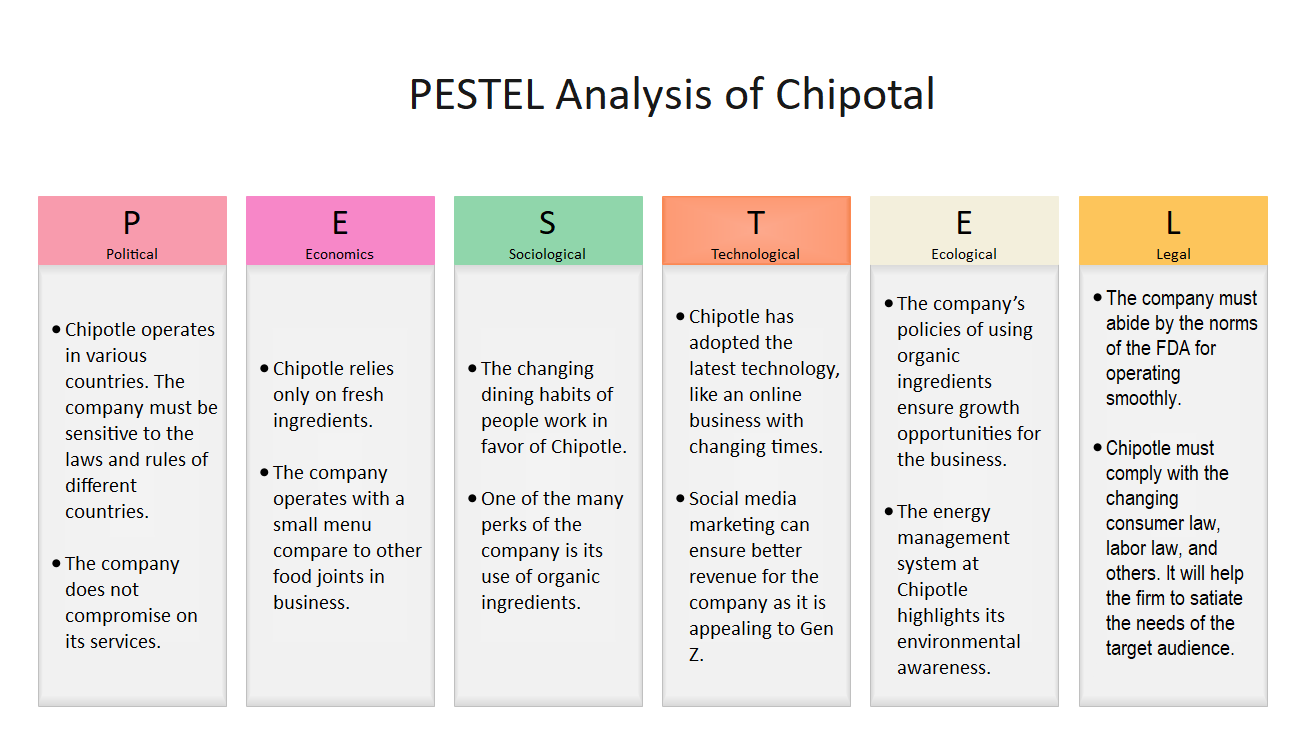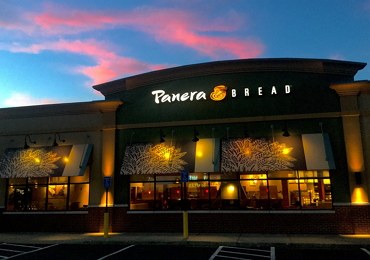Chipotle PESTEL Analysis

1. Introduction
Casual dining restaurants are entering expanding their market owing to their comfortable and laid-back atmosphere. It encompasses a segment between fine dining restaurants and fast food centers, bringing the best of both industries to the customers. The moderate price and happening environment of casual dining restaurants combined have contributed to this fast-emerging and rapidly growing industry.
Instead of the competitive market, the foodservice industry is ever-expanding. A framework like PESTEL analysis tools enables businesses to thrive, helping them identify their strengths and weaknesses. This business strategy is especially beneficial for start-ups. PESTEL analysis assesses the external macro-environment factors that have a direct impact on the profitability of a company. The analysis helps businesses identify the potential market with growth opportunities.
2. Background of Chipotle
Chipotle is a casual dining restaurant that serves Mexican-style food. This American chain of a fast-casual restaurant that began its journey as a small start-up has been setting an example for others to follow with their success story in a short time. Despite its remarkable success over the years, the company is not free from market risks. The fast-growing fast-casual dining joints are giving the company tough competition.
Chipotle PESTEL analysis the company to evaluate the changing macro-environmental factors. It includes the following metrics: Political, Economical, Social, Technological, Environmental, and Legal. The PESTLE analysis turns out to be advantageous for a company and also to ensure better revenue.
2.1 Basic Information of Chipotle
|
Company Name |
Chipotle Mexican Grill |
|
CEO |
Brian Niccol |
|
Company Type |
Fast-casual dining |
|
Year Founded |
1993 |
|
Number of Employees |
88,000 (2020) |
|
Annual Revenue |
5,985 Million US $ |
|
Founder |
Steve Ells |
|
Area Served |
United States, Canada, United Kingdom, Germany, France |
|
Headquarters |
Newport Beach, California, U.S |
|
Operating Income |
44.4 Crores USD |
3. Chipotle PESTEL Analysis
Political Factors:
Political factors of a PESTEL analysis indicate the involvement of the local or national government in a particular industry. It defines how government introduced laws, and policies including tax policy, labor law, environmental law, trade law, corruption, taxation, foreign trade policy, and more, directly affect the profitability of an industry.
- Chipotle operates in various countries. The company must be sensitive to the laws and rules of different countries.
- The company does not compromise on its services. According to PESTEL analysis, even if the FDA comes up with more strict rules regarding food quality, the business would not face difficulties.
- The rising tariff on Mexican imports may result in the increased price of products. It might lead to dissatisfaction among the customers.
Economic Factors:
The factors that affect the financial aspects of a company come under the economic metrics of PESTEL analysis. These encompass tax, exchange rate, economic growth, inflation rate, employment, and other things. It helps the companies get an idea of the purchasing power of the consumers and prepare the demand-supply model.
The economic growth of a company depends on the political stability of a region.
- Chipotle relies only on fresh ingredients. Thus, resulting in increased prices of its product. Moreover, it leads to more wastage.
- The company operates with a small menu compare to other food joints in business. It ensures less wastage of resources.
- The fluctuating labor conditions, wages, and more affect the company’s economy. The PESTEL analysis indicates that the business must make its existing strategies flexible to suit the changing economic factors of different countries.
Social Factors:
Factors that shape the customer needs of a particular region, including tradition, cultural norms, population growth, career attitude, health & safety, and more, are there in the socio-cultural factors of PESTEL analysis. All these factors help the company shape its long-term and short-term goals by understanding the local workforce.
- The changing dining habits of people work in favor of Chipotle.
- One of the many perks of the company is its use of organic ingredients. The attitude of the mass to depend more on healthier food is a growth opportunity for the company.
- The company appeals to the millennial. It is one of the major selling points of the company.
Technological Factors:
Technological innovation ensures new ways of manufacturing and distributing products opening up new revenues for the businesses. Level of innovation, automation, and technical awareness, and such things are technological factors that are analyzed to determine the scope of expansion for the company.
- Chipotle has adopted the latest technology, like an online business with changing times. However, security issues remain a challenge for the firm.
- Social media marketing can ensure better revenue for the company as it is appealing to Gen Z.
- The company needs to work on its recycling strategies to improve its profitability.
Environmental Factors:
The growing concerns over the ecological issue have made this factor more important than ever. These include pollution, scarcity of raw materials and climate change, and more.
- The focus on sustainability can go a long way. The company’s policies of using organic ingredients ensure growth opportunities for the business.
- Improved strategies for recycling and waste management in the future will help the company cope with the rising competition.
- The energy management system at Chipotle highlights its environmental awareness.
Legal Factors:
These factors often overlap with political ones. Consumer law, employment law, copyright law, health and safety laws, and more come under legal parameters. Any company must be aware of the legal factors if they wish to trade globally. Changes in legal metrics may affect the business positively or negatively.
- The company must abide by the norms of the FDA for operating smoothly.
- Chipotle must comply with the changing consumer law, labor law, and others. It will help the firm to satiate the needs of the target audience.
- To thrive, the company must take an active interest in knowing the laws and rules of the potential market.
4. Key Takeaways
Chipotle PESTEL analysis the company to analyze its existing business strategies to adapt to the changing customer needs. By analyzing these metrics, the company will have a competitive advantage over its rivals. Evaluating the various factors, PESTEL indicates that innovative strategies like a better culinary plan, focus on recycling, and sustainability could be the key to success.
Use EdrawMax Online to create a PESTEL analysis diagram, or create any other diagram with ease! There are massive PESTEL templates and symbols to choose from, and creating a PESTEL analysis diagram could be really simple. Also, you can find substantial PESTEL templates in our template community to have a quick start. If you want to know more about how to make a PESTEL analysis diagram in EdrawMax Online, just check this PESTEL guide, it may help you to create diagrams without efforts.
5. References
-
Academy, P., 2021. 'Marketing Theories - PESTEL Analysis', Professionalacademy.com, [online]. Available at: https://www.professionalacademy.com/blogs-and-advice/marketing-theories---pestel-analysis (Accessed 22 June 2021).
-
B2U - Business-to-you.com. 2021. 'PESTEL Analysis (PEST Analysis) EXPLAINED with EXAMPLES | B2U', PESTLE Analysis, [online]. Available at: https://www.business-to-you.com/scanning-the-environment-pestel-analysis/ (Accessed 22 June 2021).
-
Case48. 2021. 'Chipotle Mexican Grill Inc PESTEL Analysis', PESTLE Analysis ,[online]. Available at: https://www.case48.com/pestel-analysis/4880-Chipotle-Mexican-Grill-Inc (Accessed 22 June 2021).











